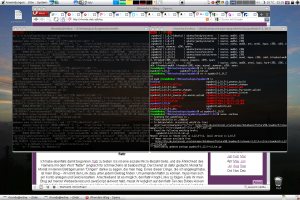Age: 37
Location: Austria (no Kanagaroos)
IRC Nick: Rhonda
How long have you been using Linux, and which distributions have you used?
My first contact with Linux was on the computer of my older brother 1994, but not really intensive. When I started to study Computer Science I had more intensive contact with it starting from 1996 onwards, installing it for myself the first time. It was SuSE back then, which was pretty well known for its good support of the German language.
How long have you been contributing to Debian/Ubuntu?
I switched around late 1998 over to Debian because of the total lack of quality in the included GNOME beta in SuSE in those days. Packages didn’t even install clearly which wasn’t something that I wanted to accept from a commercial distribution. A working collegue handed me two
Debian CDs (slink) from some magazine. I had to upgrade to potato right ahead with floppy disks to get my pcmcia network card working, and from then on never looked back again. I rarely used other OSes at that point anymore.
I started to contribute to Debian a year later or so. My first contribution was translation work — a friend asked me wether I would want to help out with finalizing the install manual translation for potato and I considered it a good idea to give something back for all the good things I got. I started digging into packaging work and offered a few packages that I liked to use during my SuSE days which weren’t packaged yet, to offer others the chance to take a peek at them, too.
To Ubuntu I’m not contributing for so long yet. I started to take a look at the bugs of my packages in Ubuntu a bit more than a year ago. I just left comments here and there and tried to check wether they were Ubuntu specific or something I could adopt. I tried to convince some people in Ubuntu to forward patches where they see it fit because having to dig around to look for them instead of having them forwarded when they are created is an overhead that shouldn’t be necessary.
Last year I considered becoming MOTU myself to be able to do sync requests and more deeper bug handling (regular users don’t have all the possibilities). Unfortunately there was this part in the Ubuntu CoC that I was unable to sign with good consience – but that got finally removed earlier this year, and since around the start of summer I’m finally a fully accepted MOTU.
What are the packages that you take care of?
You can find the list on my DDPO overview page. I’d like to special mention xblast because that was the game that got me hooked up to Linux in the early days: At a computer party in ’91 or ’92 someone showed me bomberman/dynablaster on the amiga and I always loved that game; so having a version available on Linux convinced me that I really want to give it a try. ![]()
tworld is another such game: It’s a clone of Chip’s Challenge that some might know from being included in Windows Works. And of course there is wesnoth which is sucking up most of my packaging effort and time because it’s really huge and does require a lot of resources, both compiling wise but because of that also from the packaging work because I can’t “quickly” compile it and test something out.
Those show a clear pattern (though there is a lot of other packages that I maintain too), so it’s only natural that I am involved in the Games Team, also as admin. Please notice that the Games Team is a mixed effort: It stared off in Debian, but over time we got people from Ubuntu involved and we are a combined force and almost all development in that area happens directly in Debian for the benefit of both sides.
How did you first learn about Ubuntu?
It was all over Planet Debian in the early days, and actually I was pretty sceptical about it. I had some tough discussions with central Ubuntu people about wether fixes and patches should be pushed by the Ubuntu people (who actually are producing them) or should be pulled by the Debian people (who would have quite some overhead for potential finding no difference at all, or just patches that might be Ubuntu specific). It didn’t really help to reduce my sceptic standing.
Gladly things have improved a lot since then, and I’m glad to be able to help people on both sides to understand the other a bit better.
What do you find the most interesting in working for Debian and Ubuntu?
I’ve worked and still work in really many different places in Debian. Translation work, website team, tracking security issues for debian backports, various package maintenance, QA work on a very broad spectrum…
I can’t really name a spot that’s most interesting because I usually do dig into areas that I notice are in desperate need of a helping hand: I left the German translation work behind because I saw enough enthusiastic people in that area getting more and more involved — and even though I do have my troubles with some choices they make, my effort can be used better in areas that are lacking people working on them.
Maybe that’s why I guess the most interesting area for me seems to be QA work, because it’s so diverse. There is so many different levels on which one can explore it, and the data in the Ultimate Debian Database, which contrary to its name also has a fair amount of Ubuntu specific information in it, gives ideas for even more and more research work and general approaches to finding spots to tickle.
What ways of improvement could you suggest for the Debian and Ubuntu communities?
That both can and should learn from each other. It’s one thing to have a document like the Ubuntu CoC but it’s a different to live up to it outside of Ubuntu, too. And there are people who rightfully fear that such a document would help hiding problems people are told to not mention issues. I though still believe that a similar guideline would do its good for Debian.
Also, people should try to understand that both projects have different procedures. We both use .deb for our binary packages, but the way we produce them and the tools and services we use along that path are often different. People shouldn’t assume that something is obvious to others because they do it for a long time already and it’s obvious to themself.
As a packager, what would you like to see more from upstream developers?
In a fair share of my packages I’m extremely happy with my Upstream Developers: I started to send them links to the Package Tracking Service at packages.qa.debian.org and explained to them how to subscribe to things they might be interested, and a fair amount of them did that. Since then it did happen to me several times that I already found an answer to a bugreport in my inbox when I managed to read the original submission.
Do you have any advice for new people wanting to contribute to Ubuntu/Debian Development?
Find an area you are intersted in and look for packages in there that piled up a fair amount of bugreports. Just right ahead start looking at them, try to reproduce them and leave comments with your findings. Eventually you might receive a mail from the package maintainers wether you might want to join the team and get involved more deeper.
If you are not that confident on your coding or packaging skills you can find a mentor to help you boost your skills, or there are a lot of other areas that can need help too, like translation work which will help a lot of people that aren’t as fluent in English so don’t think of that work as a minor job.
What do you do in your free time besides open source?
I always enjoyed listening to music of various kinds (including seeing bands live), you can find mentioning of that in my blog from time to time. I also enjoy a good movie at times. My rollerskates are my most used sports tool, and since a half year I have a son to look after which demands a fair amount of attention too.
What are you looking forward to most in the upcoming Maverick and Squeeze?
That I will be able to do QA work on the release critical bugs in squeeze right from the start and not halfway through when they piled up pretty high already. About the upcoming Maverick release I am looking forward to hopefully also get changes submitted to the packages.ubuntu.com site in a more timely manner. We’ll see whether that works out in the end. The packages sites are an interesting area, both on Debian and Ubuntu, and I have some things on my todo list for them. Watch the spot!
[Discuss Gerfried Fuchs’ Interview on the Forum]
Originally posted by Maia Kozheva here on September 21, 2010

